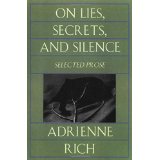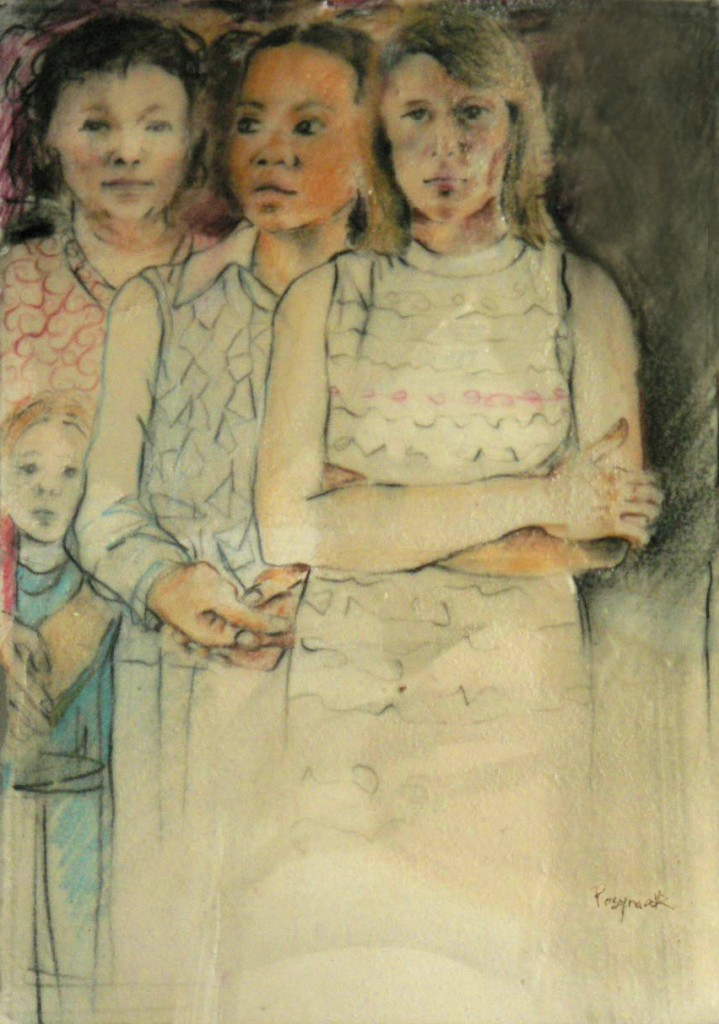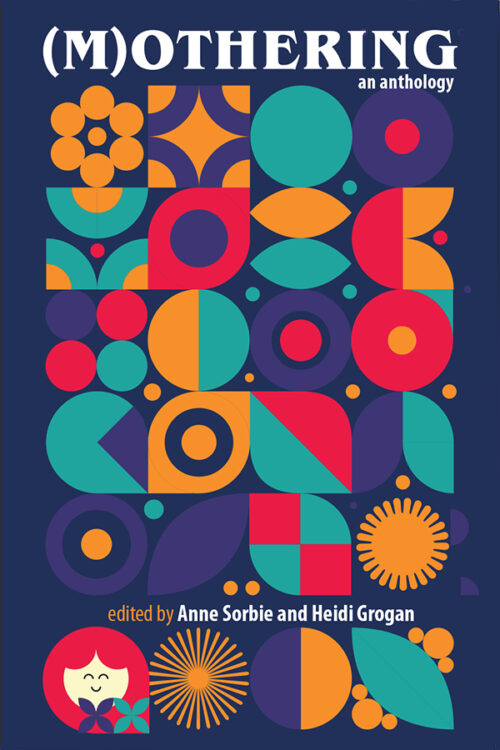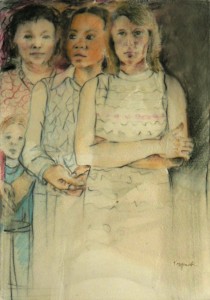Many writers I love taught me my feminism. On International Women’s Day, I celebrate one writer in particular, Adrienne Rich, whose clarity of thought and forceful writing changed the course of my life. 
“Motherhood in Bondage” first appeared in the New York Times on the Op-Ed page on November 20, 1976. It is reprinted in many places, including a compilation of Rich’s prose called On Lies, Secrets, and Silence (Norton, 1979). By the time I read “Motherhood in Bondage,” (likely some time in 1993) I was already a mother and had already absorbed some feminist consciousness, despite my upbringing. I believed women must have the same rights as men. I knew that although some of the big issues like suffrage were settled, there were plenty of other important issues like pay equity that still needed to be sorted out. I had no reason to believe that this would not happen. Progress towards a more just society was inevitable, I thought. People marched, there were hearings or inquiries, problems were explained, legislation changed.
What I hadn’t thought about to any great degree were the systemic forces that kept oppression (not just women’s oppression but all oppression) going. I hadn’t thought about how those in power might create systems on purpose to benefit themselves and that changing the rules for women or people of colour or any powerless group might not be their priority. I had not thought about the effort that those in power put toward keeping a system that benefited them in place.
My pregnancy, the birth of my daughter and my new role of mother made me see how women remained oppressed in fundamental ways. My daughter was born in 1992. I had to fight to receive my full maternity benefits, something that the law said I was entitled to but my employer was ready to deny me. The threat of legal intervention was needed to resolve the dispute. Preparing for the birth, I had wanted a midwife but was told that if I had one, I would have no access to my doctor or a hospital in case of emergency. I don’t even know if this was true or simply a threat, but I acquiesced. I had never felt so patronized or controlled. At about twenty two weeks, strong contractions and bleeding sent me to the hospital and I was told it was nothing and sent home. I was made to feel like I had wasted everyone’s time, but if I had stayed home and anything had happened, I would have been blamed for that too. During my daughter’s birth, I was scolded. It was taking too long. The doctors, the same ones that were so essential to this process, did not intervene when they should have, caused me unnecessary suffering and then blamed me for it. After the birth, when my daughter didn’t immediately latch on, I was told that my insistence on breastfeeding was jeopardizing her life. They insisted on formula. I would not let them give her any. Her lethargy was blamed on me because I had, in the long hours of unproductive labour, taken a pain killer and this had made her groggy. It was my fault she would not latch, they said. The nurse left my chart out. I read it. It said I was non-compliant. I left the hospital. At home, I struggled to understand what had happened to my life. My once reasonably equitable marriage had become something else; my husband went to work and I breastfed, looked after our baby, our house, our meals, our errands and did all the unpaid labour. This seemed fair. I was home. Why wouldn’t I do all of these things? The logic seemed unassailable, but somehow, I knew it was flawed.
Meanwhile, my husband had become a father and he was still encouraged to pursue other goals. I was not. Although I knew that my “work,” had value in the broader scheme of things, I had no place in that scheme anymore. I was encouraged to join a mother’s group. I did. It depressed me. I did not go back. For the first time since I was thirteen years old, I did not earn money. I was utterly dependent and I felt ashamed. I looked into returning to work, daycare, pumping breast milk, all of it. Much as I wanted to be back in the bigger world, I wasn’t ready to let go of the baby to do it. I made a choice. (And before you stomp all over me, I recognize many women have no such choice. I recognize my privilege. But this is, after all, a personal essay. This is how it was for me. I’m not claiming that this is how it is for everyone.) Being forced to make the choice felt like cruel but all-too-usual punishment. But punishment for what? For being a mother? My husband was never judged for his choices, but I would be judged for mine. All the while, I felt that the choice I was being asked to make was somehow false. I felt there had to be another way.
I began looking for kindred spirits, teachers, someone who could explain what had happened to me, what was happening to women who became mothers, and I found Rich.
The understanding that male-female relationships have been founded on the status of the female as the property of the male, or of male-dominated institutions, continues to be difficult for both women and men. It is painful to acknowledge that our identity has been dictated and diminished by others, or that we have let our identity depend on the diminishment and exploitation of other humans. This idea still meets with resistance that has always risen when unsanctioned, long-stifled realities begin to stir and assert themselves.
Painful to acknowledge indeed. And not just for me. For my husband too. It was not his intention to oppress me, and I knew that. But by default, he belonged to a political and social context that oppressed me. Rich explained that my sudden dependence and vulnerability did not happen because of a particular failing of mine or a particular meanness within my husband. This was vital to remember. And she also explained that figuring out a better way to relate to one another and the world was essential and was going to be difficult. But no matter what our social and political context, we always have agency. We always have free will. I had to do everything I could do to improve the situation.
“The power politics of the relations between the sexes, long unexplored, is still a charged issue,” wrote Rich. “To raise it is to cut to the core of power relations throughout society, to break down irreparably the screens of mystification between ‘private life’ and ‘public affairs.'” Indeed. Motherhood as an experience, as a political institution, had been defined by men. Women played by their rules. Men created legislation around birth control and abortion. In a fundamental way, women were (and still are) unable to decide for themselves if they wish to become mothers. At the time, men still wholly controlled the guardianship of children in the courts, the educational system and within the family. Men dominated women economically, an inevitability in a capitalist system that valued men’s work more than women’s even when they did the same work. Again, this is still true. And finally Rich explained how the women who challenge this system, who question it, who try to break free of it, were seen as deviant. And we all know what happens to deviants.
Rich wrote, “the pressure on all women to assent to the ‘mothering’ role is intense.” This is what I was feeling; the pressure to be a mother in a way that had been prescribed by someone else, in a way that allowed me to survive but not thrive.
I could have given in. I could have swallowed hard and gone along to get along, put up and shut up. I didn’t. In the conclusion of the essay, Rich had given me my marching orders, although I wouldn’t understand for many years that I had accepted the challenge she offered. She wrote:
Such themes anger and terrify precisely because they touch us at the quick of human existence. But to flee them, or trivialize them, to leave the emotions they arouse in us unexamined, is to flee both ourselves and the dawning hope that women and men may one day experience forms of love and parenthood, identity and community that will not be drenched in lies, secrets, and silence.
I wanted to find this better future for myself, for my baby, and for my husband. I examined my life. I learned more. I studied. I worked in the community. I observed. I listened. I taught Women’s Studies. I tried to help others understand these issues and more. And although it was never easy, it got better. I had a goal in mind, a vision of equity, if not equality, a sense of fairness. On this International Women’s Day, I thank Adrienne Rich for giving me direction. I hope that every woman can break free of her own lies, secrets and silence. I’m still working on it. It’s a life-long quest.




